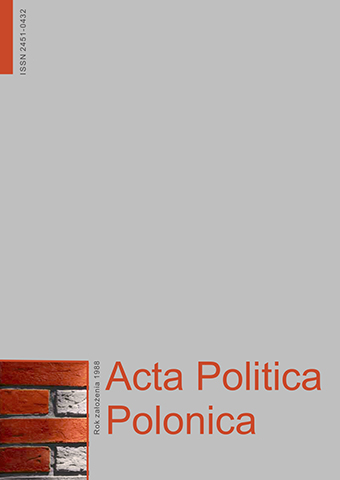
ISSN: 0867-0617
OAI





Issue archive /
1/2014 (27)
Język narodowy jako instrument mobilizacji politycznej w Walii i Kornwalii na początku XXI w.
(National language as an instrument of political mobilization in Wales and Cornwall in the beginning of 20 c.)
| Authors: |
Bartomiej
Toszek
Instytut Politologii i Europeistyki, Uniwersytet Szczeciński |
| Keywords: | devolution, linguistic rights, national identity |
| Data publikacji całości: | 2014 |
| Page range: | 14 (67-80) |
Abstract
Presupposing invariability of hitherto centrifugal tendencies in a frames of devolution reform and predevolution processes in Wales and Cornwall, questions of protection and development of national language are expected to remain in the Welsh/Cornish authorities centre of interests. Published by the Welsh Government and the Cornish Council schemes of national languages contains postulates of widening range of cymraeg or kernewek teaching, strengthening of bilingualism in public sphere and subsidizing of Welsh/Cornish media. However top to down stimulation of bilingualism would not succeed if most of people in Wales and Cornwall will be still English speaking. Which is more reducing number of Welsh speakers and slow growing number of Cornish speakers shows both these languages have no practical sense and are not able to compete with English. There is no reason to overestimate meaning of Welsh and Cornish in political mobilization processes because their role was only to confront Welsh and Cornish cultural diversity. Literally interpreted and appeased by the UK Government demands of legal and institutional guarantees of both languages protection and development caused finally displacement of public interests to other measures for realizing main aim, it is widening or implementing devolution processes.
Bibliography
| 1. | Awbery G.M., The Term ‘Landsker’ in Pembrokeshire, „Journal of the Pembrokeshire His-torical Society”, 1990–1991, nr 4. |
| 2. | Ball M.J., The Celtic languages, London–New York 2004. |
| 3. | BBC News, Cornish gains official recognition, http://news.bbc.co.uk/2/hi/uk_news/england/2410383.stm. |
| 4. | BBC News, Cornish language no longer extinct, says UN, http://www.bbc.co.uk/news/uk-england-cornwall-11935464. |
| 5. | Bodlore-Penalez M., Atlas of Stateless Nations in Europe, Talybont 2011. |
| 6. | Bogdanor V., Devolution in the United Kingdom, Oxford 2001. |
| 7. | Cockcroft L., Cornish language makes a comeback, „The Daily Telegraph”, 21.05.2008. |
| 8. | Cornish ‘has 557 speakers’, „The West Briton”. |
| 9. | Cornwall Council, Cornish National Minority Report 2, Truro 2011. |
| 10. | Cornwall County Council, An Outline of the Standard Written Form of Cornish, Truro 2008. |
| 11. | Dafydd F., Welsh Icons, Ceredigion 2007. |
| 12. | Davies D., Pembroke is Little England after all!, „The Western Mail”, 8.01.2004. |
| 13. | Davies J., A History of Wales, London–New York–Toronto–Dublin–Camberwell –New Delhi–Auckland–Johannesburg 2007. |
| 14. | Davies N., Wyspy, Kraków 2003. |
| 15. | Europejska Karta języków regionalnych lub mniejszościowych, (Dz.U. 2009 nr 137, poz. 1121). |
| 16. | Department for Communities and Local Government, The United Kingdom’s Second Re-port to the Council of Europe under the Framework Convention for the Protection of Na-tional Minorities, London 2007. |
| 17. | Haywood J., Celtowie. Od epoki brązu do New Age, Warszawa 2008. |
| 18. | Heyck T., A History of the Peoples of the British Isles: From 1870 to Present, London 2002. |
| 19. | HM Government, e-petition: Recognition of Cornwall as a National Minority, http://epetitions.direct.gov.uk/petitions/2835. |
| 20. | Jones R. W., Trystan D., The 1997 Welsh referendum vote, w: Scotland and Wales: Nations Again?, red. Taylor B., Thomson K., Cardiff 1999. |
| 21. | Kaczorowska M., Dewolucja systemu politycznego: istota, wpływ i znaczenie – casus Zjed-noczonego Królestwa Wielkiej Brytanii i Irlandii Północnej, w: Szymanek J., Kaczorowska M., Rothert A., Ewolucja, dewolucja, emergencja w systemach politycznych, Warszawa 2007. |
| 22. | Majewicz E., Majewicz A.F., Języki celtyckie na Wyspach Brytyjskich, Wrocław –Warszawa–Kraków–Gdańsk–Łódź 1983. |
| 23. | Mercator-Education: European Network for Regional or Minority Languages, The Welsh language in education in the UK, Ljouwert/Leeuwarden 2001. |
| 24. | Obara J., Kategoria ducha językowego w poglądach niektórych niemieckich i polskich my-ślicieli XIX i XX wieku, w: Język a kultura. Podstawowe pojęcia i problemy, red. Anusie-wicz J., Bartmiński J., Wrocław 1991. |
| 25. | Office for National Statistics, Census 2001. Report on the Welsh language, London 2004. |
| 26. | Office for National Statistics, 2011 Census: Welsh language skills – unitary authorities in Wales, London 2012. |
| 27. | Parker M., Neighbours from Hell?, Talybont 2007. |
| 28. | Pilkington C., Devolution in Britain today, Manchester–New York 2002. |
| 29. | Sapir E., Kultura, język, osobowość. Wybrane eseje, Warszawa 1978. |
| 30. | Szul R., Język, naród, państwo. Język jako zjawisko polityczne, Warszawa 2009. |
| 31. | The Dynamics of Devolution. The State and the Nations 2005, red. Trench A., Exeter-Charlottesville 2005. |
| 32. | The National Archive, Welsh Language (Wales) Measure 2011, http://www.legislation. gov.uk/mwa/2011/1/contents/enacted. |
| 33. | The National Archives, Welsh Language Act 1967, http://www.legislation.gov. uk/ukpga/1967/ 66/enacted. |
| 34. | The National Archives, Welsh Language Act 1993, http://www.legislation.gov. uk/ukpga/1993/38. |
| 35. | The Welsh Language Board, About Us, http://www.webarchive.org.uk/way back/archive/2012 0330000810. |
| 36. | Toszek B. H., Kużelewska E., Od wizji do rzeczywistości. Dziesięć lat dewolucji w Walii, Warszawa 2011. |
| 37. | Toszek B.H., Perspektywy dewolucji w Kornwalii, w: Regiony Europy. Uwarunkowania, wyzwania i perspektywy rozwoju, red. Stępień-Kuczyńska A., Dośpiał-Borysiak K., Łoś R., Toruń 2009. |
| 38. | United Kingdom Parliament, Government of Cornwall Bill 2008-09, http://services. parlia-ment.uk/bills/2008-09/governmentofcornwall.html. |
| 39. | Welsh Assembly Government, A National Action Plan for a Bilingual Wales, Cardiff 2003. |
| 40. | Welsh Government, Welsh language: Annual report 2010–2011, Cardiff 2011. |
| 41. | Welsh Assembly Government, Welsh Language Scheme, Cardiff 2007. |
| 42. | www.byig-wlb.org.uk/english/about/Pages/index.aspx. |